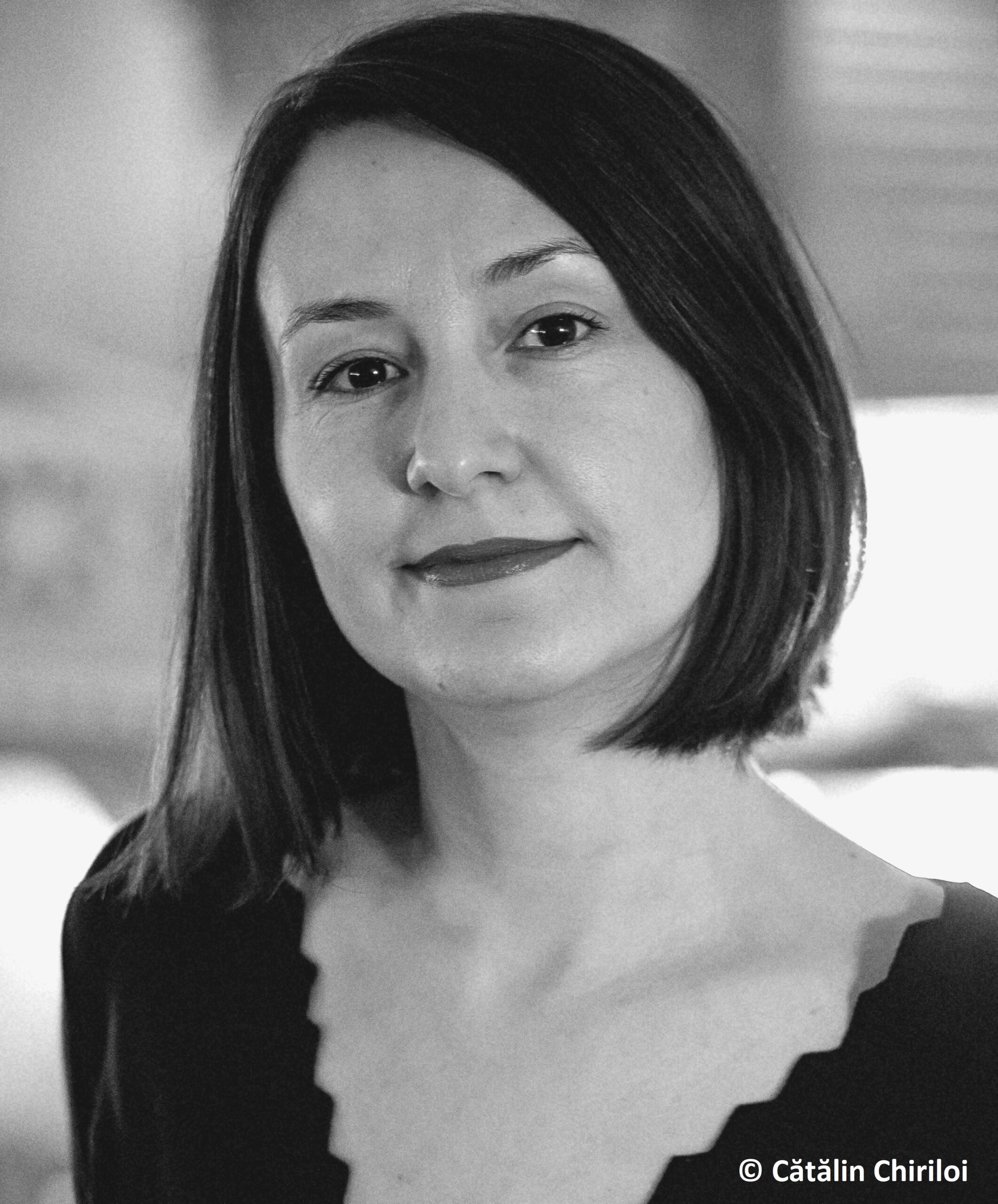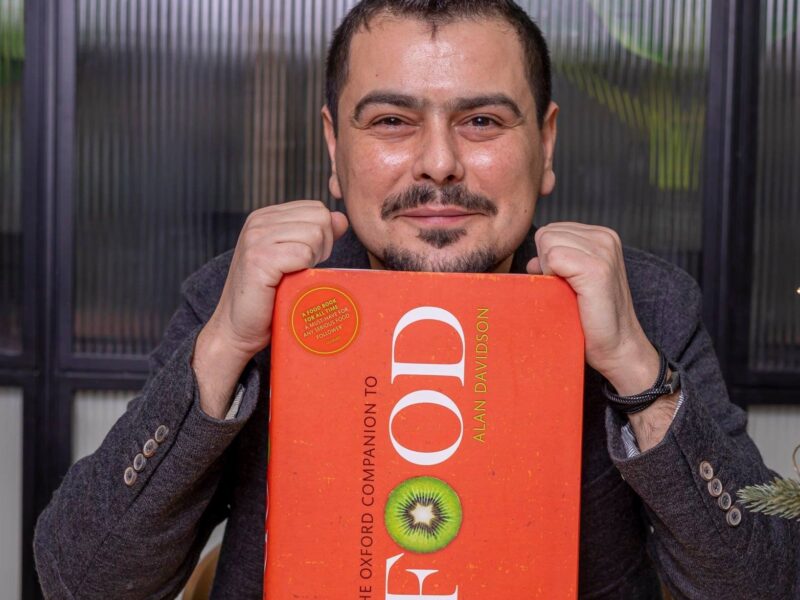Cristina Marin is Rights Manager at Humanitas Publishing House. She studied geography and tourism, and somewhere along the way she ended up in publishing. She joined the Humanitas team in 2008 and then took a short detour at Livia Stoia Literary Agency, only to return to Humanitas, where she has held the same position since 2011. She is part of the team organizing the About the World We Live In conferences initiated by Humanitas Aqua Forte Foundation, for which, as is the case for the rights manager job, she works with enthusiasm and professionalism.
You studied geography and tourism, but you work in a publishing house. What is the most beautiful place on Earth?
I am convinced that each of us has a place that we consider the most beautiful from a personal point of view, so I can only be subjective. For me, the most beautiful place on Earth is where I can feel and hear the nature. When I'm in the middle of nature I manage to rebalance myself. So sorry if I disappoint, I don't know if you were expecting an answer from me based on my knowledge of geography. J
You first joined Humanitas team in 2008 as a Rights Assistant. How did you end up working with them and what did the beginnings look like?
In 2008 I was looking for another job because I had given up the idea of working in the field of tourism and wanted to change direction; I had been flirting with the idea of working as a translator or something similar for some time. Anyway, I felt that my next job would have to involve working with books and foreign languages. I came across the job ad by chance and I admit, I was a bit intimidated, I even hesitated at first, but, in the end, I plucked up the courage and submitted my CV, then came to the interview. There, I had an immediate connection with my future colleagues. From day one they made me feel like I was part of the team and patiently showed me pretty much everything about this field, which was completely new and mysterious to me at the time.
The feeling that I remember best in the first months at Humanitas was that something unreal was happening to me. I was surrounded by so many books and so many people dedicated to their craft that I wanted nothing more than to keep up and do my best to stay in the field.
I felt like I was finally in the right place.
Not long after, you took a detour at the Livia Stoia Literary Agency, where you changed direction: from purchasing translation rights to selling them. What did this change bring and what was the experience like as a literary agent?
It was a welcome change and I thank Livia for the opportunity. It was a necessary experience, I could say, because I saw what it's like to work on the other side of the barricade.
That's how I learned to appreciate the work of a literary agent. The efforts behind the promotion are not always visible by the people in the publishing house, or maybe I simply did not have enough experience to realize what this work employs.
Since then, however, I begin to see with different eyes every email and newsletter received from the agents, because I know how much effort is put into each one. I had the opportunity to work with various people from many publishing houses in Romania and, again, this broadened my horizon on the publishing world. At the same time, I had the experience of working with foreign publishing houses as their representative, as a term of comparison.
Moving to the agency also relatively coincided with the expansion of activities to other European markets, first in Serbia and other neighboring countries. What was the dynamic, how did you build the relationships with the publishers there?
Like any beginning, it was quite challenging and demanding. Emerging into the book markets of Serbia, Poland and Albania is not easy at all. But it was also kind of "funny" because when no one answered your emails, you had to take it to the next step, which was to call them and explain who you were and what you wanted from them. Communication was not always easy because many did not speak English very well and were a little reluctant at first, but slowly, slowly we managed to win them over. I think Livia's visits to the territories played an important role. Even though I'm not there anymore, I'm glad to see how beautifully the relationships have grown and to know that I also took a little part into this expansion.
In 2011 you returned to Humanitas and since then you are Rights Manager. What does this job involve?
The position of Rights manager is quite demanding and includes several aspects. As writer Radu Paraschivescu would say in one of his "collections" of quotes, "life is complex and involves multiple aspects". The main activity is related to contracting foreign titles and pursuing the fulfillment of certain conditions in the copyright contracts. That's the short version. If I did the full description, I think I would finish the interview and not have time for other questions. A very interesting and important aspect of this job is the foreign book fairs where you do a lot of networking and have the opportunity to solidify already existing relationships. This experience gives another dimension to this job.
What does your working day look like?
I can say that no day is the same, which is not necessarily a bad thing. On the contrary, it's actually something that keeps you connected to the present. You have to be prepared for the unexpected, especially around book fairs. I think that this is actually what attracted me to work in the publishing house, everything is alert and in order to publish a book you have to communicate with all departments, from the technical to the editorial department, to marketing, accounting, and back office.
A normal day starts with checking the mailbox and identifying and solving all the emergencies that have arisen, then returning to the regular agenda, where I try to either check off the things left over from the day before, or take on all the new activities one by one, which are generally not few, but I always try to prioritize them correctly.
However, other emergencies may arise throughout the day that can derail this process off course. As we joke in the office, big emergencies swallow small ones. J
And so there is never a dull moment in the copyright department. J
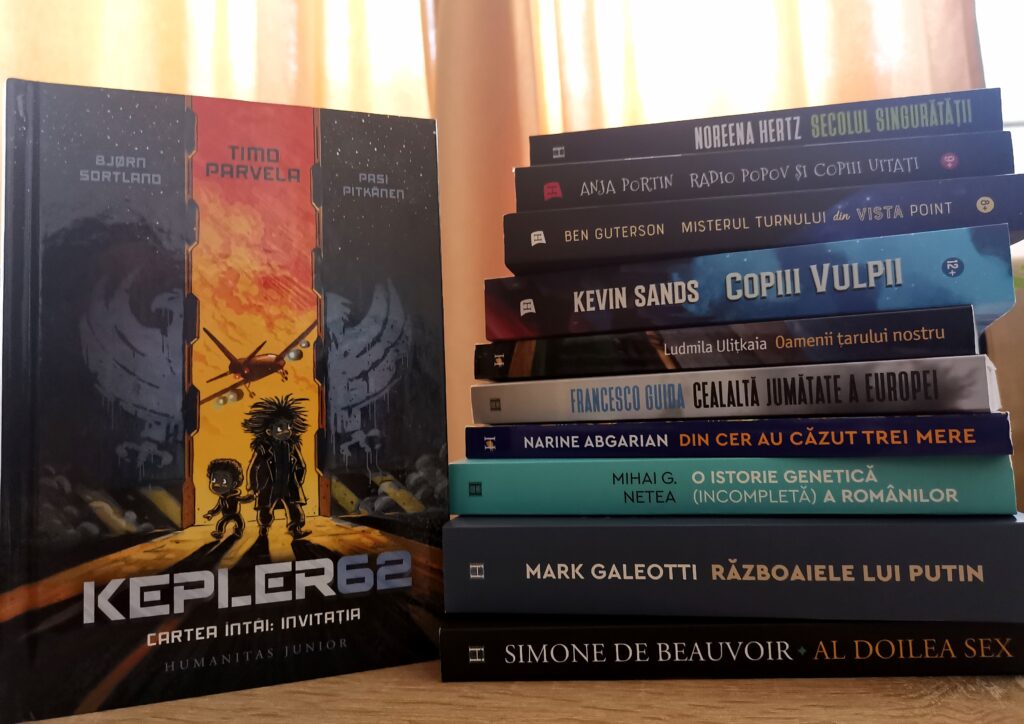
I imagine that your inbox is flooded daily with dozens of new title suggestions from agents and publishers abroad. How do you manage to navigate through all of them and make sure you don't miss a title that might suit Humanitas?
Yes, I admit that one of the biggest challenges of this job is dealing with hundreds of emails with catalogs and editorial proposals on a daily basis. I'd like to say that I never miss an editorial proposal, but that would be untrue. The catalogs are forwarded to the editors quite quickly, and I choose a specific moment of the day to whip through them quietly. Of course, if individual editorial proposals come in that are extremely suitable for us, then I ask for the manuscript for reading on spot.
What are the requirements by which you select a title to send to editors for review?
The selection of titles implies, first of all, a good and deep knowledge of the publishing house's portfolio. And, if I'm allowed a little self-praise, I can recite the Humanitas portfolio on spot, at any time of day or night J. Then, I try to analyze a title based on the description in the pitch received from the agents and see if it would fit our profile, and in which collection, so that I can route the manuscript to the right editor. Other times it can be a title with a topic not addressed by us until that moment, but which I think could be of interest in the future. J
When it comes to blockbuster titles, publishers usually have to take part in auctions in order to get the translation rights. Do you have any experience with this? Do you have a title for which you brought out the big guns and the whole arsenal of persuasion?
It's hard for me to think of a specific title, there have been many instances over the years when I entered auctions which sometimes lasted for weeks, especially when discussing bids on multiple titles. You can imagine the emotional toll that came with these situations, but I was able to manage them and thus I learned a lot from these experiences.
I loved the times when the author had the last word and asked to see a marketing plan or a letter from the publisher; that was the moment we had to play our cards right. Ah, I think those were the most satisfying moments, winning those auctions.
The interaction with a new title does not end when the contract is signed and the bills are paid, as there are front cover and/or interior approvals, publication reporting, shipping of complimentary copies to authors, and so on. For me, as an agent, working together is a pleasure, because you always take care of all these stages. How do you keep up with so many titles in the Humanitas and Humanitas Junior portfolio? Is there a secret method or magic wand?
If there is any, please, lend it to me too, I would really appreciate it. J
. I would say that the vital aspect of this question is a well-crafted database from which you can get the right information quickly.
The second aspect would be a well-established communication between departments.
And, the rest of it is just lots and lots of work.
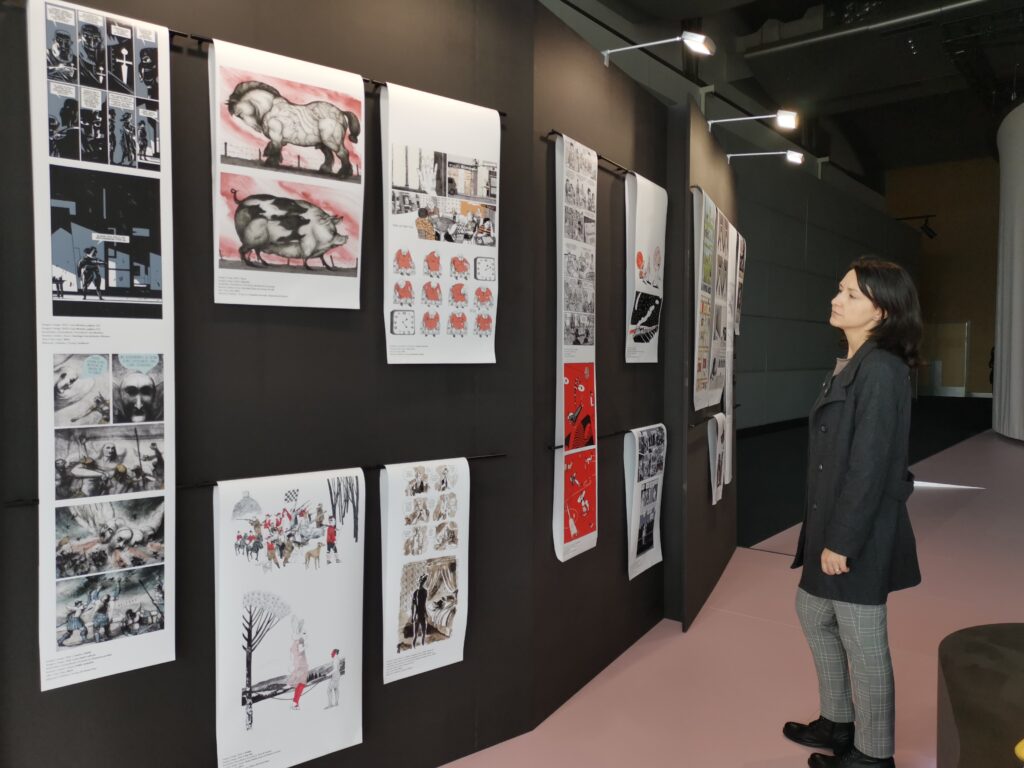
You participated in many editions of international book fairs which you mentioned above. Do you remember your first experience? What do your book fair days look like now?
You should know that, although I have been working in a publishing house for so many years, I had my first experience at an international fair as a literary agent. And now I can say that, unsurprisingly, the perspective of a literary agent is completely different from that of a rights acquisition manager. Anyway, the first feeling was overwhelming, to know that you are taking part in an event of such magnitude as the Frankfurt Book Fair. I was meeting so many people that, at the end of each day, I had the feeling that I forgot my own name. J I learned a lot from my first fair and I was so nervous that I wasn't even confident of my English or if I was telling the right things to the publishers and agents that I met.
Now, I don't have those emotions anymore, especially since every year I meet again with people that I talk on a weekly basis via email, we already have professional relationships for many years and we also allow ourselves small informal comments, something I didn't even dare to dream of at my first fair. But the joy remains there, doubled by the experience that speaks for itself.
Since 2019, you are also coordinating Humanitas Aqua Forte Foundation’s About the World We Live In conference series. How did they slip their way into such a busy schedule, and what does their planning assume?
The fact that I was offered to be part of the Humanitas Aqua Forte Foundation team was a welcome challenge. I took it as a new opportunity, especially since it was something completely different from the rights manager job, where I spend most of my time in front of a laptop. Now I had to get out of my comfort zone and team up with other colleagues from other departments.
I have not regretted for a moment that I made this choice, because I really liked the dynamics behind the organizing of such an event.
The preparation of the conferences starts a year in advance, and that involves a well-planned schedule. We try to stick to the schedule as much as possible, not to have any delays etc. It's a really huge effort, put in by all the involved colleagues, and the communication between us is the most important aspect. If we manage to communicate, then we manage to solve any new problem in time.
This project seems to be very important to me and, I dare say, even necessary for the times which we live in; so, I feel lucky to be a part of it. I learned a lot of things from this experience that I might not have had access to otherwise.
Important names of international cultural scene took the stage of the Romanian Athenaeum, including Mark Galeotti, Oliver Jens Schmitt, Alexandra Martin, Mihai Netea, Noreena Hertz. How do you manage to bring them to Romania and what are the logistics behind their visits?
It depends. Sometimes it can be easy, sometimes not. For example, Noreena Hertz had confirmed her presence for last year's edition (2022), but there was a last-minute change in her schedule and unfortunately she had to cancel; but we were very happy that she was able to participate this year, so we took it as a victory, even if a delayed one. J
The most important thing is that the speakers confirm their desire to attend the conference. After that, things go smoothly. If we talk about the logistics, then it is very "fun" because we have to "handle with care" each guest individually and we, the team, have to somehow split up and attend to the needs of everyone. While some need to be picked up from the airport, others need to be accompanied either to interviews or to other destinations or attractions. But so far we've managed to coordinate and not forget anyone at the airport. J Just kidding, of course, but the organizing effort is indeed considerable.
What has been the most successful edition or conference so far?
I think the 2020 edition, or at least that's how it stays on my mind now that I look back, because it took place two weeks before the pandemic lockdown and somehow we all felt a little threatened. Even some of the guests who came from the USA canceled their visit for this reason, but we managed to bring the edition to the end, the spectators came to the Athenaeum and enjoyed listening to conferences on interesting topics presented by personalities such as Mircea Cărtărescu, Horia-Roman Patapievici, Manfred Spitzer or Dr. Mihai Netea. Little did we know at that moment that that would be the last chance for a long time when we would all be able to sit in the same theater without fearing each other.
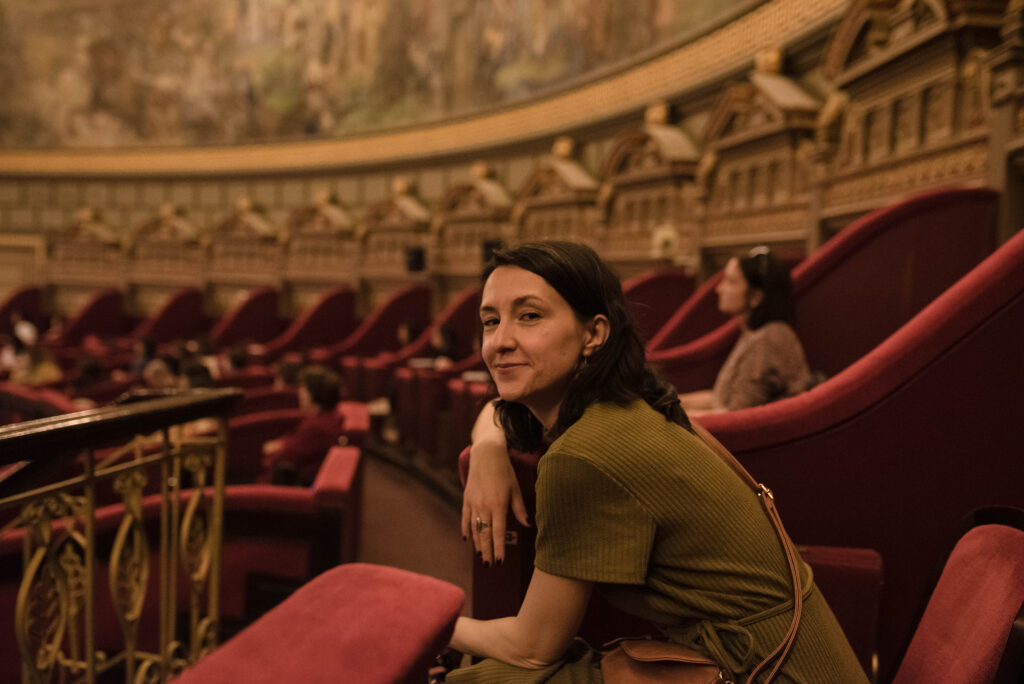
What is your professional moment of glory so far, the one that was worth the tons of emails, the stress of deadlinesand everything else?
It's quite hard to narrow everything down to one specific moment. There are a lot to choose from: the auctions won after weeks of hard negotiations, or the moment when you see a book fresh from the press right on the verge of a book fair, when you know how much work was put into it and I'm not just talking about myself here, I'm talking about the entire editorial office. If I had to mention a special moment strictly for me, it must be the one when I was accepted to a fellowship in Paris in 2018, which I did not hope for. It was a different sort of experience that added another level to this complex position of rights manager. I spent a week in Paris, learning a lot about the French publishing world together with other fellows from various countries such as Argentina, China, and Sweden. It was a unique, and so far, unmatched experience.
If little Cristina could bring her favorite writer or character to the Athenaeum stage, who would she bring and what would they talk about? What about Cristina from 2023?
With this event, we try to bring the most interesting and relevant people and topics on the stage of the Athenaeum, which may help us understand the world in which we live.
I think one of the things needed in these times would be to learn to be more empathetic. I'd like us to bring in someone who can show us how we can do this without being afraid to show our vulnerability. To prove to us that patience and kindness do not make us weaker, on the contrary. And I am sure that we will find that person (or those persons), be it an artist, a psychologist etc., because it is a topic that cannot be exhausted in one conference.
Little Cristina would probably like to see Jane Austen, Edgar Allan Poe or Oscar Wilde on the stage of the Athenaeum! I know they are such opposite personalities, but they have always fascinated me and they are the ones that developed my appetite for reading. I think it would be delightful to hear them discuss current affairs.
[The photos are part of Cristina Marin’s personal archive.] [Translated into English by Edward Vasile.]

